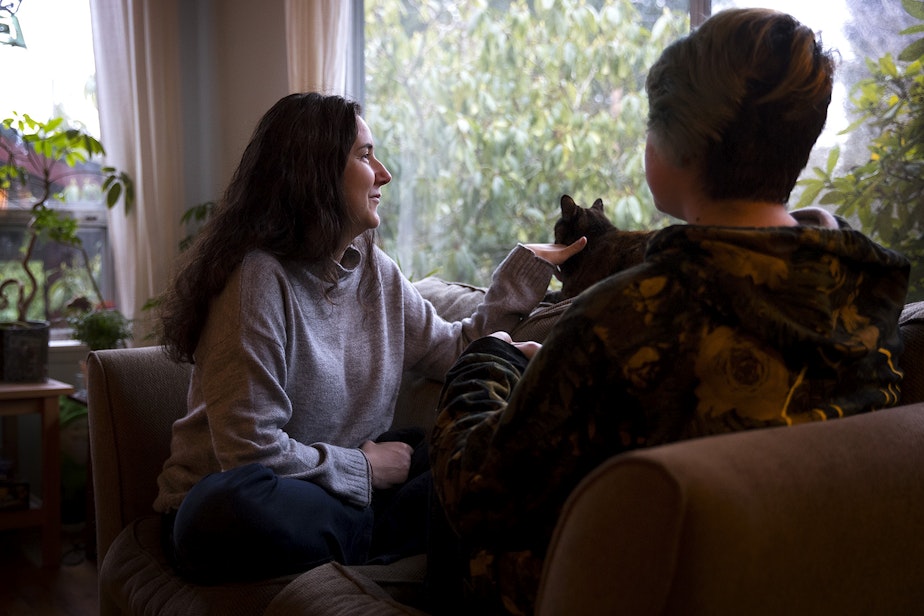Alex was 13 and depressed. So why couldn’t his mom check in with his therapist?

Alex’s life fell apart in middle school.
He had been a smart, happy kid, his mom said, if a little sensitive.
But then he turned 13 and … Depression. Eating disorder. Self-harm.
“I was hearing things that weren’t there,” Alex, now 16, said on a recent afternoon.
He and his mom, Michelle, were making soup in their tidy kitchen in north Seattle. We are not using their last names to protect Alex's privacy.
“I was sleeping in my closet for a couple of weeks because I thought there were cameras in my room,” he said. “That food wasn’t safe to eat. And I was just scared of everything.”
Sponsored
The number of adolescents reporting anxiety and depression are on the rise, with a state survey finding that one in five high schoolers have seriously considered suicide. Alex was among them.
[Read part 2 of this series: Should parents be able to weigh in on teens' mental health treatment?]
“There was a solid year and a half when he would go to take a bath, and I would stand outside the door, you know, (knock, knock, knock), hey how are you doing in there?” Michelle said.
“Every five minutes, just to make sure everything was okay. And, you know, when I would wake up in the morning the first thing I would do was walk to his room to make sure he was still alive.”
Michelle found a program for Alex, but he didn’t share details of the program with her, which meant she was in the dark. He could do this because a Washington state law treats teenagers, age 13 and older, as adults when it comes to mental health treatment.
“I learned that there was this law that says, ‘Hey, 13-year-old, your parent does not have a right to access information about you ... unless you give permission to do so,'” Michelle said. “My son chose not the give that permission.”
Sponsored
So while Michelle drove Alex to his weekly appointments, she had no idea how he was doing or how best to support him at home. Michelle said she felt helpless. She couldn’t understand how her mentally ill 13-year-old son could make those decisions.
“He had lost touch with reality and thought nothing except ‘when, how can I die?’” she said. “To take a child, a 13-year-old child in that condition, and say, you’re driving the bus. That’s egregious.”
In Washington, you are considered an adult at the age of 18. But there are exceptions in the law where younger kids can act as their own decision-makers. For instance, for reproductive health services, like birth control or abortions. For substance abuse treatment. And for mental health care.
Related: When a 14-year-old chooses to die because of religion, can anyone stop him?
Sponsored
The law dates back to 1985. It was meant to help teens who were homeless, or victims of abuse, or who were estranged from their families get help without their parents’ consent. It was also thought young people would open up to a therapist if they could keep their struggles private from their parents.
Phil Talmadge is a former Washington state senator who wrote the legislation. “You wanted to encourage kids to get that kind of mental health service,” Talmadge said. “If there was an impediment because of this age of consent, then we wanted to remove that impediment.”
In some cases, the law allows teens to refuse treatment altogether. Miriah, who lives in Vancouver, Washington, is the mother of a 15-year-old son. Her son, who we are not naming to protect his identity, is on the autism spectrum. When he was 12, he became violent and suicidal and was hospitalized multiple times.
At age 13, he ended up at Fairfax Hospital in Kirkland. And because he was 13, he could discharge himself, “which is one of the scariest things that we’ve had happen,” Miriah said.
After her son left the hospital, Mariah says, he attacked her with a broken broomstick and then tried to kill himself. Miriah wishes that her son had not been in charge of his treatment. “My son is a very intelligent and thoughtful,” she said.
Sponsored
“He can make good decisions when he's not in crisis. But he needs guidance to do that because he's only 13 and he has an impairment.”
It makes sense that parents would complain about a law that reduces their control. But some mental health care providers also find it problematic. Kathy Brewer, an administrator at Seattle Children’s Hospital, and also a therapist, said it’s important to engage parents.
“My oldest son had really severe asthma as a young child and it got better,” Brewer said. But what if her son’s doctors weren’t able to tell him what meds he needed? “What a disaster.”
Miriah’s son spiraled in and out of hospital emergency rooms. Eventually he was arrested. He was given the choice between juvenile detention and a long-term mental health treatment program. He chose treatment. He’s now in school, much improved.
Alex, from the top of this story, is also better. He wound up in long-term treatment, but out of state, in Massachusetts, where the age of consent is 17.
Sponsored
Both moms are now pushing for a change in state law that would give parents more rights to be a part of their kids’ treatment. A bill is now being drafted in the legislature.
Reporter Deborah Wang is spending the year doing stories on teenagers and mental health as part of a Rosalynn Carter Mental Health Journalism Fellowship. If you have a story you would like to share with Deborah, please email youthmentalhealth@kuow.org.
Produced for the web by Isolde Raftery.




